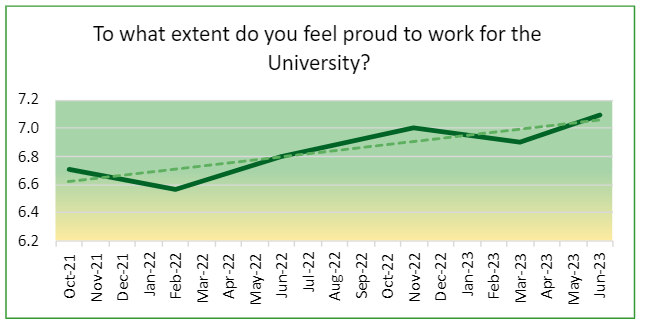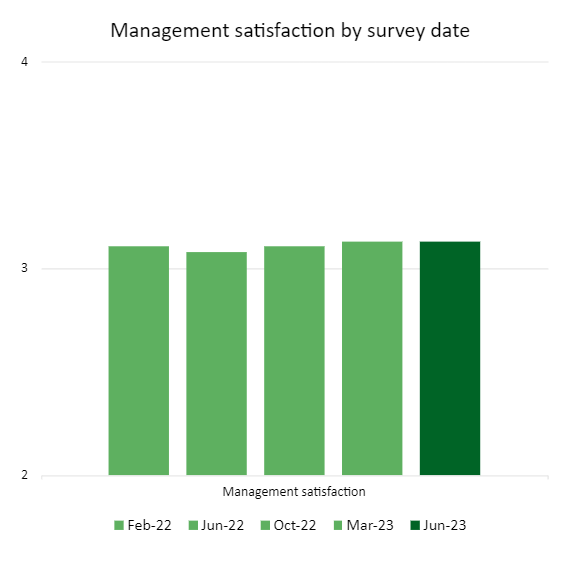Survey results
Thank you for completing the recent Work and Wellbeing survey. These are the results of the core questions in the Work and Wellbeing Survey run in June 2023. The report outlines the headline results. The response rate for the survey was 942 (25%).
Summary
Carried out between 12 and 27 June, the latest survey was run against a backdrop of the Marking and Assessment Boycott. The flexible questions focused on ways of working as part of the evaluation of hybrid and these results will be reported to a future UEB.
The response rate was 25%, and predominantly completed by staff in the MSA job family (62%) and female staff (67%). This profile may be (partly) attributable due to the focus of the survey. Consideration of this is needed when interpreting the results.
The headline for the core questions (relating to wellbeing, harmony, and management) is that they remain stable and they remain good. There is some movement within scores reflecting the seasonal influence but generally responses are positive across the board. The convergence of scores (and experiences) within variable groups as witnessed in the previous survey has been less marked this time. Again, certain groups have different experiences of working here. Perhaps of particular note, job family and work location are predictors of perception. Further work is needed to understand the reasons that lie behind this.
Undoubtedly influenced by the focus of the survey, the comments overwhelmingly relate to flexible working (appreciation of, desire for more). Associated with this is an aspiration for a more appealing and appropriate campus environment not only for work but for building a sense of community. Although not in the top comments, workload continues to be raised as a concern, largely by E&R staff
What's next?
The core results have been presented to the University Executive Board (UEB) and areas identified for further work include a review of the ways of working and further exploration to understand issues and root causes of workload. A detailed analysis of the hybrid working results will be reported separately to a future UEB.
Longitudinal analysis of core questions
ONS4 Wellbeing questions




- In the latest survey, ONS4 wellbeing indicators increased slightly compared the previous survey in March 2023 and are in line with the results from June 2022
- Life satisfaction has improved since the last survey but is marginally lower than in the June 2022 survey, but not statistically different from other survey timepoints. Happiness levels have also improved since March 2023 and Anxiety levels are significantly lower than in February 2022 survey. Whilst feelings of worthwhile improved slightly since the last survey in March 2023, it is not statistically different to previous timepoints.
- University figures continue to be slightly lower than national levels
Harmony questions



- Sense of community has decreased slightly since the last survey in March 2023
- Staff's sense of pride to be working at the university, has increased since the last survey and is also significantly higher than in February 2022 and marginally higher than in October 2021
- Satisfaction with work-life balance has improved slightly since March 2023 and is marginally better than in October 2021 and February 2022
Management satisfaction questions

- Management satisfaction was statistically significantly higher in the June and March 2023 survey than at previous timepoints since February 2022. Comparison with October 2021 survey was not possible due to no management satisfaction data being collected at that point
Qualitative analysis
Responses from staff to the question on any other comments they would like to make. 380 comments were received.
| Theme | % | Insight |
|---|---|---|
| Impact Hybrid- Positive | 21 | Recognise benefits of both campus AND remote working. Value flexibility based on individual and job needs, Leading to benefits – personal (w/l balance, wellbeing , financial) and institutional (productivity, recruitment, retention) |
| Impact Hybrid- Negative | 21 | Regret over a loss of informal social connection (‘water cooler’ moments*) and wider benefits that come with this. Sense of a loss of community and efforts needed to re-build (through meetings, social events, space) With particular implications for new starters. |
| Bath Hybrid Model- Framework | 14 | Aspiration for more flexibility largely within the Bath Hybrid Model (BHM) to maximise benefits. Questions over 40,60,80% ‘rule’. More informal flexibility to meet job and individual needs. Working alone, together – needs to be meaningful. |
| Bath Hybrid Model- Application | 14 | Issues around how the BHM and other flexible work policies are applied. Concern that it is more about being present than being flexible. Difference in application leads to issues over fairness. Importance of the role of the manager. Training important in supporting managers. |
| Flexible work arrangements - Future | 14 | Appetite for more flexible work options – particularly the 4-day week. As well as more flex in the flexitime scheme. Personal benefits mainly cited. |
| Flexible work arrangements - Other | 14 | Varied |
| Campus work environment - Facilities | 10.5 | Request for more food outlets serving quality food. As well as better access to drinking water* and improved water facilities. |
| Campus work environment - Informal space | 10.5 | The call for staff space particularly offering food continues. Also to make better use of existing space for staff. |
| Campus work environment - Work space | 10.5 | Improvement required to maximise hybrid working e.g. through private space, collaborative space. |
| Campus work environment - Condition | 10.5 | Office spaces in poor condition (outdated, temperature, noise) |
If you would like the graphs presented on this page in a more accessible format please contact comms@bath.ac.uk.
